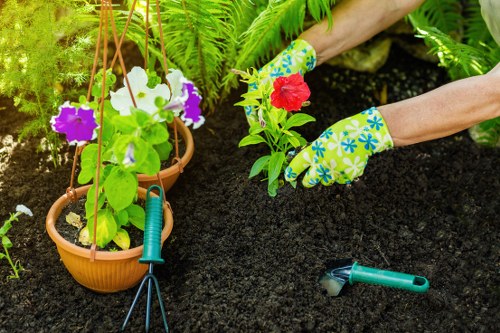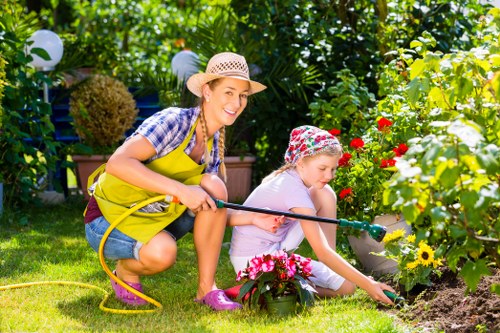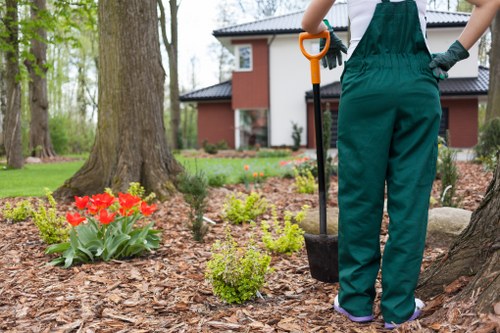Garden Fence Installation in Elephant and Castle

Installing a garden fence in Elephant and Castle can transform your outdoor space, providing security, privacy, and aesthetic appeal. Whether you're looking to create a serene garden retreat or simply define your property boundaries, choosing the right fence is essential.
Elephant and Castle, a vibrant area in South London, offers diverse architectural styles and garden spaces. Understanding the local environment and regulations is crucial for a successful garden fence installation.
This guide will walk you through the steps of selecting, planning, and installing a garden fence in Elephant and Castle, ensuring your project is both efficient and compliant with local standards.

Benefits of a Garden Fence
Garden fences offer numerous advantages beyond mere aesthetics. They can enhance property value, provide safety for children and pets, and create a private sanctuary away from the hustle and bustle of city life.
In Elephant and Castle, where urban living is prevalent, a well-installed fence can make a significant difference in your home's functionality and appearance.
Additionally, a fence can serve as a support for climbing plants, adding greenery and life to your garden space.

Choosing the Right Material
Selecting the appropriate material for your garden fence depends on various factors, including durability, maintenance, and style.
- Wood: Offers a classic look but requires regular maintenance.
- Metal: Durable and low-maintenance, with options like wrought iron or aluminum.
- Vinyl: Resistant to weather and pests, providing a clean, modern appearance.
- Composite: Combines wood and plastic, offering durability with a natural look.

Planning Your Fence Installation
Proper planning is essential for a smooth fence installation process. Start by measuring your garden area to determine the length and height of the fence needed.
Check local building regulations in Elephant and Castle to ensure your fence complies with height restrictions and material guidelines.
Consider the placement of gates and how they will integrate with your garden's layout.

Hiring a Professional vs. DIY
Deciding whether to hire a professional or undertake the installation yourself depends on your skill level, budget, and the complexity of the project.
- Professional Installation: Ensures precision, adherence to regulations, and saves time.
- DIY Installation: Cost-effective and allows for personal customization but requires more effort and expertise.
In Elephant and Castle, many local contractors specialize in garden fence installations and can offer tailored solutions to meet your needs.
Step-by-Step Installation Process
Follow these steps to install your garden fence effectively:
- Planning: Measure your garden and decide on the fence layout.
- Permits: Obtain any necessary permits from local authorities.
- Materials: Purchase the required materials based on your chosen fence type.
- Preparation: Clear the installation area and mark fence lines.
- Installation: Install fence posts, panels, and gates as per the instructions.
- Finishing: Apply any finishes or treatments to protect the fence from the elements.
Maintenance Tips
Regular maintenance ensures the longevity and appearance of your garden fence:
- Inspect for damage or wear annually.
- Clean the fence periodically to prevent dirt buildup.
- Reapply paint or sealant as needed for wood fences.
- Check metal fences for rust and address promptly.
Local Considerations in Elephant and Castle
Understanding the local climate and soil conditions in Elephant and Castle is vital for selecting the right fence material and installation method.
South London's weather can be wet and humid, so choosing weather-resistant materials like metal or vinyl is advisable.
Additionally, considering the area's architectural styles can help you select a fence that complements your home's design.
Closest Areas to Elephant and Castle for Fence Installation
- Kennington Known for its historic houses, perfect for traditional wooden fences.
- Walworth Offers urban garden spaces ideal for sleek metal or vinyl fences.
- Camberwell Features large backyards suitable for taller privacy fences.
- Pimlico High-end residences may prefer ornate wrought iron fences.
- Brixton Eclectic gardens that can benefit from colorful composite fences.
- Stockwell Practical installations for smaller garden areas.
- Herne Hill Suburban feel suitable for picket or lattice fences.
- Vauxhall Modern homes that might favor minimalist vinyl fencing.
- Blackfriars Central location with opportunities for custom fence designs.
- Clapham Diverse garden styles accommodating various fence materials.
Cost Considerations
The cost of garden fence installation in Elephant and Castle varies based on material, length, and whether you hire a professional.
On average, wooden fences can range from £30 to £50 per meter, while metal fences may cost between £50 and £100 per meter.
Vinyl and composite fences generally fall between these ranges, offering a balance of cost and durability.
Permits and Regulations
Before installing a garden fence in Elephant and Castle, it's essential to check local building regulations and obtain necessary permits.
Height restrictions typically range from 1.2 to 2 meters, but specific rules may apply depending on the area.
Compliance ensures your fence is legal and prevents potential fines or the need for modifications.
Environmental Impact
Consider the environmental impact of your fence materials. Opting for sustainable or recycled materials can reduce your garden’s ecological footprint.
Additionally, using natural wood treatments can minimize chemical runoff into the soil.
Enhancing Your Garden with Fencing
A well-chosen fence can enhance the overall design and functionality of your garden. Incorporate elements like trellises, planter boxes, or decorative panels to add character and charm.
Lighting along the fence can also improve safety and highlight garden features during the evening.
Integrating your fence with existing garden structures ensures a cohesive and harmonious outdoor space.
Choosing the Right Color and Finish
Color and finish play a significant role in the fence’s appearance. Choose colors that complement your home's exterior and the surrounding garden.
Natural wood stains highlight the fence’s grain, while painted finishes can add a bold statement or blend seamlessly with your property.
Regular maintenance of the color and finish ensures your fence remains attractive and protected from the elements.
Security Features
If security is a primary concern, consider adding features such as gates with secure locks, anti-climb designs, or height extensions.
Metal fences provide a robust barrier, while smart locks can enhance functionality.
Proper installation with firmly anchored posts ensures the fence serves its security purpose effectively.
Final Thoughts
Installing a garden fence in Elephant and Castle is a rewarding project that can significantly improve your outdoor living space. By carefully selecting materials, planning the installation, and adhering to local regulations, you can create a beautiful and functional fence that meets your needs.
Whether you choose to hire a professional or take on the project yourself, a well-installed fence will provide lasting benefits for years to come.
Frequently Asked Questions
- What is the average cost of installing a garden fence in Elephant and Castle?
The cost varies based on materials and fence length, typically ranging from £30 to £100 per meter.
- Do I need a permit to install a garden fence in Elephant and Castle?
Yes, it's essential to check local regulations and obtain necessary permits before installation.
- Which fence material is best for the wet climate of South London?
Metal and vinyl fences are highly recommended due to their durability and resistance to moisture.
- Can I install a garden fence myself, or should I hire a professional?
It depends on your skill level and the project’s complexity. Hiring a professional ensures compliance and quality installation.
- How long does a garden fence installation take?
The installation time varies but typically takes a few days, depending on the fence type and length.